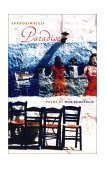~WILLIAM ALLEGREZZA~
DON SCHOFIELD:
APPROXIMATELY PARADISE
. . . Schofield
presents the parting
of love, the haunting presence
of the past, and the
feeling
of alienation; moreover, he creates
a compelling picture of
the Greek
landscape; he has a good eye
for details.
Throughout,
the voice of the poet is a strong presence . . ..
Throughout
Don
Schofield's Approximately Paradise, the Greek landscape
underlies
his poetic language. The feel of dancers, the gathered workers,
the
living ports — vibrant images of daily life are presented with foreign
eyes, for Schofield is an American transplant in Greece aware of his
outsider
nature. Many of his poems negotiate alienation and belonging and
explore the  border
of American and Greek literature. Fortunately, unlike many poets,
especially foreign poets who fall under the sway of Homer's demesne,
Schofield
presents his poetry as a dialogue with past voices, such as those of
Homer,
Seferis, and Ritsos. He doesn't lose himself in their
subtleties;
rather, he meditates on some of the same themes of these poets:
love,
death, war — one can almost hear echoes of the ancient Greek lyric
poets
through his words.
border
of American and Greek literature. Fortunately, unlike many poets,
especially foreign poets who fall under the sway of Homer's demesne,
Schofield
presents his poetry as a dialogue with past voices, such as those of
Homer,
Seferis, and Ritsos. He doesn't lose himself in their
subtleties;
rather, he meditates on some of the same themes of these poets:
love,
death, war — one can almost hear echoes of the ancient Greek lyric
poets
through his words.
In
the
first section of the book, "Islands," Schofield presents the parting of
love, the haunting presence of the past, and the feeling of
alienation;
moreover, he creates a compelling picture of the Greek landscape;
he has a good eye for details. Throughout, the voice of the poet
is a strong presence, even as he contemplates the desire of losing
one's
self. Even more interestingly, he presents poetic knowledge as an
aspect of the body — one knows through desire and feeling, yet this
knowledge
is complicated by the crumbling of the body in time;
appropriately,
several of the poems in this section discuss death in almost
Whitmanesque
fashion.
In
the
second section, "Sarcophagi," as the name suggests, Schofield presents
images
of death, not only classical sarcophagi which he describes, but cities
under a halo of death, such as Beirut:
My bride and I
leave our clothes behind the door and go into
that empty room. When the spotlights pass,
our bodies shine like toppled statues.
In the midst of
locked-down Beirut,
Schofield presents an action of tender desire, but one overshadowed by
the spotlights, which leave the tenderness as a toppled thing. In
this section the poet takes on the voices of others: Eidothea,
Lazarus,
Polyphemus, Callicles, and he also develops one of the themes that
ranges
through the poems in the third section: the lost pleasures of the
past that haunt us. This theme is explored in the title poem,
"Approximately
Paradise," which is a reflection on Masaccio's painting of Adam and Eve
in Florence. Like Adam and Eve, we long for our lost paradise —
we
have been kicked out of the garden, but we cannot turn to the past,
Schofield
suggests, but only to the creative space of art:
The lively browns
of Masaccio's brush
are the range of wants
we recall or wish
we recalled as we stare
through locked glass.
The third
and fourth sections examine Schofield's return trips to the U.S. to
explore
his past and finally to explore his sense of belonging, even if
somewhat
on the fringe, to the Greek society he inhabits. Yet, these poems are
not
filled with romantic vistas of the past. When Schofield presents
his boyhood haunts, he does so with both longing and regret, as he says
in describing a painting of blue pears:
And the tinge of blue along the edge
is the ripeness surrounding our lives
as we hold to what we first knew
of pleasure, the seed
of all sorrow.
Schofield does not end
the book on
a note of sorrow; rather, at the end, after we have followed his
journey through alienation and the past, we see his past and his
present
come together in a sense of belonging in a community, a sense tempered
with understanding.
On
the
whole, Schofield's Approximately
Paradise is a well-crafted work that takes
us on a lyric journey through an expatriate's eyes, but this is not a
work
confined to the local; rather, Schofield's exploration of his personal
experience — his ups and downs of desire and his contemplation of death
— is understandable by all. Finally, as an introduction to this
poet, Approximately
Paradise leaves us wanting more, even though we are glad to have
experienced
what we have.
Schofield, Don. Approximately
Paradise. Gainesville, Florida: University Press of
Florida,
2002. ISBN 0-8103-2461-7 $12.95
© by William
Allegrezza



![]()
![]()
![]()
![]()